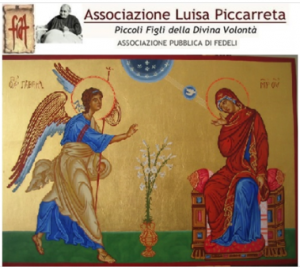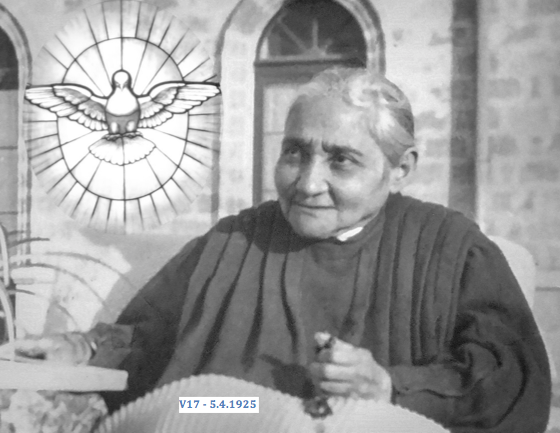
(Click here for website)
Behold the handmaid of the Lord: a simple and ordinary life“
7/23/2018
In one of those poor houses lives a young woman named Maria. Nazareth is a small village and many know of its existence. She is a discreet, quiet, and caring girl with everyone and always ready with a smile. Her life and story unfolds in seemingly anonymous simplicity and ordinariness. Her day begins early. When the sun is far from peeping on the horizon and the house is still shrouded in the quiet of the night, Mary gets up and begins to pray. Her relationship with the Lord, in silence and listening, constitutes the essential pivot, the supporting and irreplaceable axis of her days and her life.
For us as well prayer must represent the central and essential moment, the source of pure water with which to satisfy our thirst for meaning and the infinite. As we look at Mary we must learn to abandon the sphere of our little “I”, of our desires and needs. Our prayer must be abandonment in the hands of the Father and the desire for Him, because regenerated and clothed in His grace we can seek only His glory and Kingdom here and now, in the present hour, in the reality and immediacy of the moment we are living. This does not mean that we should not hand Him over our poverty, littleness, our personal limits, dreams and hopes. Nevertheless, these cannot and must not define and limit our prayers. The Father knows everything about us, He knows what we need beforehand, even without asking. To the great gifts of His love He will add all the rest in their entirety, fullness and abundance.
Mary lived completely immersed in history and in the customs of her people; she is the daughter of the little town of Nazareth. Ever since she was a child she experienced exclusion and derision on the part of the Jews as well as the pure and educated who had always looked upon Galileans with suspicion and scorn. Her people however were proud, tenacious, faithful and joyful. Above all, they dreamed of a different society that would be welcoming and supportive. They had always fought against every form of injustice and oppression, placing all hope only in their faithful God. Sooner or later the prophecies of the fathers would come true and for this reason they awaited, with complete trust, the redemption of Israel and the advent of the Messiah who would restore law and justice, peace and solidarity.
It was within this context that Mary grew and was formed. She was an ordinary woman, like many that one could meet every day; she was far from receiving accolades from the society in which she lived and not particularly meritorious, from a purely human perspective, of the attentions and considerations of her contemporaries. She did not live in luxury and comforts, but rather grew in love and obedience to God. Her daily life knew home-made bread, household chores, the handling of the humble and burdensome offices of housewives, work, and disinterested service and attention to those who suffered. She was often seen at the well holding her pitcher while she entertained herself with her peers, waiting her turn to draw water, and every Sabbath in the synagogue.
Even Mary’s ordinary life lived in the Divine Will allowed her to transform that little house of Nazareth into a paradise. Being the Eternal Word, Jesus possessed by His own virtue the Divine Will within Himself and in that little Humanity resided immense seas of light, sanctity, joys and infinite beauties. Mary possessed the Divine Will by Grace, and although she could not embrace immensity like Jesus, because He was God and Man and she was always His finite creature, the “Divine Fiat” nevertheless filled her so much that It formed seas of light, holiness, love, beauty and happiness.
In this house of Nazareth the Kingdom of the Divine Will was in full force. Every one of Mary’s small acts, such as work, lighting the fire and preparing food, were all animated by the Supreme Will and formed on the foundation of holiness and pure love. Therefore, from the smallest to the greatest act immense joys, bliss and beatitudes were released, and Mary remained inundated by the pouring rain of indescribable new joys and happiness.
The Divine Will possesses by nature the source of all joys and when it reigns in the creature it delights in giving in each act an incessant new act of Its joys and happiness. In the house of Nazareth all was peace, utmost union, and one felt honored to obey the other; even Jesus would compete, because He wanted to be commanded in small jobs by His Mother and Joseph.
In this house of Nazareth, the Kingdom of the Divine Will was formed in Mary and in the Humanity of Jesus to make It a gift to the human family, if willing to receive the good of this Kingdom. Although Jesus was King and Mary Queen, they were King and Queen without a people; their Kingdom could encompass all and give life to all, but it was deserted because, firstly, Redemption was required in order to prepare and predispose man to enter this Kingdom so holy. Therefore, the hidden life of Jesus and His Mother for many years served to prepare the Kingdom of the Divine Will for creatures.
In this house of Nazareth, Jesus made his Mother the custodian of His entire life. When God accomplishes a work He does not leave it suspended, nor in a void, but always looks for a creature who can enclose all His work and bear it up; otherwise He would risk making His work become useless. So Jesus placed in Mary all His works, words and sufferings, everything; He even deposited His breath in His Mother: He would tell her all the Gospels that He had to preach in public and the Sacraments He had to institute. He entrusted all to her, placing everything in her and making her the everlasting channel and source, because from her were to issue forth His life and all His goods to benefit all creatures. The Virgin Mother felt rich and happy in being the depository of all that her Son Jesus did!
The Divine Will that reigned in Mary gave her the room to receive everything, and in His Mother Jesus felt the exchange of love and glory from the great work of Redemption. Never having done her will but exclusively the Will of God, the Virgin Mother always had at her disposal the life of her Son; and while He was always in her He could make her bilocate to give her to whomever would ask for her with love.
If we also will never do our will but always the Divine Will and live in It, our Heavenly Mother will deposit all the goods of her Son in our soul. We will have at our disposal a divine Life that will give us everything, and Mary as a true Mother will stand guard so that this life may grow in us and form the Kingdom of the Divine Will.
don Marco
